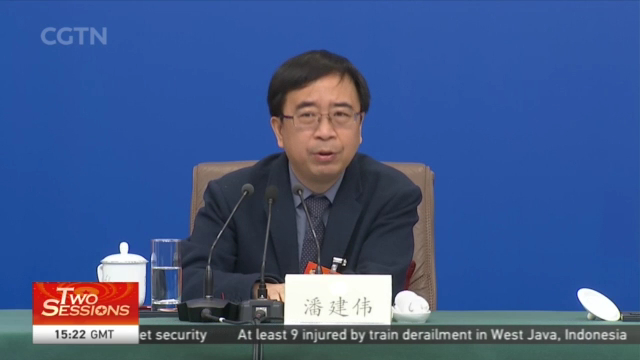
09:10, 11-Mar-2019
China's Quantum Physics Research: Why is it so important?
Updated
09:10, 14-Mar-2019
02:16

Also at China's Two Sessions, the country's political advisers discussed quantum physics and how it's being applied to national security. Leading physicist Pan Jianwei explained why the field is so important. CGTN's Liu Yang reports.
Five top advisors took questions from the media on topics ranging from science to the arts and poverty alleviation to the Guangdong-HK-Macau Great Bay area. One that caught many peoples' attention was about the world's first quantum communications satellite, launched three years ago. CGTN got the chance to ask its leading scientist about the discoveries that have been made and the significance of this leading technology, which has opened door to a new era of global communications.
PAN JIANWEI CPPCC MEMBER "As a scientific experiment satellite, it is mainly used for two purposes. On the one hand, it is practical to realize the secret communication between the earth and the satellite over a long distance, so as to meet the needs of the security communication of some application departments. The computers and mobile phones used by each of us are the scientific achievements of quantum mechanics."
Pan, a professor at the Chinese Academy of Sciences, has been nicknamed the 'father of quantum'. Quantum communications in itself can be applied to different sectors, such as national defense, government affairs, finance, and energy.
PAN JIANWEI CPPCC MEMBER "The remote control system should be protected from hackers' attacks; otherwise, we cannot ensure its smooth and safe operation. With the quantum satellite, we can support societal operations with unconditional security. And with the country's support, we will be expanding the Mozi satellite's coverage and those of other quantum satellites, which the people can benefit from earlier than expected."
China plans to develop a medium- to high-earth-orbit quantum communications satellite that will be able to provide round-the-clock services in the next few years. Pan says his team is planning to design one that will supplement the Mozi satellite, which can currently only function at night due to interference from the sun. Liu Yang, CGTN Beijing.

SITEMAP
Copyright © 2018 CGTN. Beijing ICP prepared NO.16065310-3
Copyright © 2018 CGTN. Beijing ICP prepared NO.16065310-3